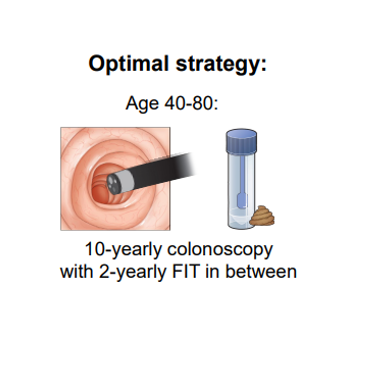Our modeling study, granted by ZonMw and published this week in Gastroenterology, shows that the current surveillance in individuals with a family history of CRC can be improved by combining colonoscopy with FIT.
Individuals at increased colorectal cancer (CRC) risk due to their family history are recommended surveillance to reduce that risk. This surveillance consists of 5-yearly colonoscopy between ages 45-75 years. Due to the invasiveness of a colonoscopy, there is a growing interest in exploring less invasive strategies for surveillance. For example, fecal immunochemical testing could potentially be used to extend the surveillance interval between two colonoscopies, or even as a substitute for colonoscopy. In this modeling study, we assessed whether surveillance in individuals with an family history of CRC can be optimized in terms of cost-effectiveness, effectiveness, colonoscopy burden, and costs by tailoring surveillance to the level of CRC risk and by using stool-based testing to guide the timing of colonoscopies.
The Adenoma and Serrated Pathway to Colorectal Cancer–FCRC model simulates CRC development in individuals with a family history of CRC. We first simulated a strategy without surveillance, the current Dutch guideline (5-yearly colonoscopy between ages 45 and 75 years), and the following 3 sets of alternative strategies: colonoscopy surveillance, surveillance combining colonoscopy and fecal immunochemical test (FIT), and FIT-based surveillance. Each set included a range of strategies differing in age range and test interval. The optimal strategy was determined using a multistep decision algorithm, which jointly considers multiple outcomes that are relevant to stakeholders in the field. The algorithm consisted of the following criteria: (near-)efficient in terms of incremental cost-effectiveness, noninferior effectiveness, no substantial increase in colonoscopy burden, and not more expensive.
Our study showed that fecal immunochemical testing could play an important role in surveillance for individuals with a family history of CRC. Ten-yearly colonoscopy with 2-yearly fecal immunochemical test between ages 40 and 80 years was the optimal strategy. This strategy led to more health gains and reduced colonoscopy burden and costs compared with current surveillance. Current surveillance was not (near-)efficient in terms of cost-effectiveness.
